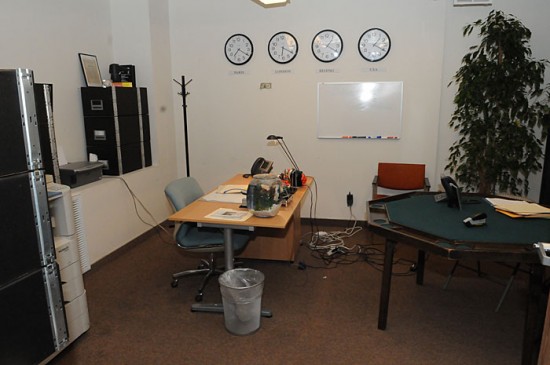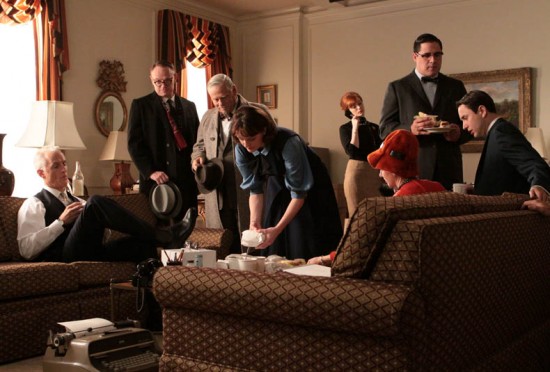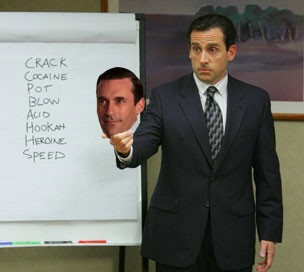An Uncanny Similarity Between Mad Men And The Office
When the season finale of Mad Men was over, there was a minor tinge of déjà vu that I couldn't immediately pin down. Hours later, it occurred to me that one of the major twists in the finale shared several fun similarities to The Office (Scranton Branch). In fact, up until the epiphany, I had never considered Don Draper to be every bit the serious, hip and fair boss that Michael Scott is delighted to find in the mirror each morning when he combs back his hair. As is /Film's reader friendly policy, spoilers ahead...

In the fifth season of The Office, Michael Scott (Steve Carell) finds himself in the exceedingly disagreeable predicament of losing control and independence as a boss in face of alien corporate pressure and supervision. Dunder-Mifflin has sent a Regional Vice President (Idris Elba) to get him in line. The culture clash leads to him ultimately consulting with his boss and CFO David Wallace (Andy Buckley) and quitting the company. He simply will not and cannot compromise in regard to a loss of power and status. The new regime goes against everything he stands for (and imagines he stands for).
In no time, Michael Scott envisions a makeshift dream company that utilizes key talent and personal favorites from his old company. Without the permission of his former bosses, he stealthily recruits his top female employee and former receptionist, Pam Beesly (Jenna Fischer) for the risky start-up. However, while Pam's loyalty to Michael never really wanes permanently in face of his overconfidence and man's-world air (one of the reasons Michael adores her), she wants and stipulates a sizable promotion and larger role in his company. Pam views herself as a professional and independent modern woman (at one point she considered being one in New York City). Michael agrees and makers her his head saleswoman. One possible conflict to Pam's decision is that her lover, Jim, works for Dunder-Mifflin was quietly a competitor of Michael's.
Michael proceeds to recruit his top male employee, Ryan Howard (B.J. Novak), into the fold. A few of Ryan's attributes are that is he pretty damn arrogant, contemptuous, snobbish, and prone to weighing and making unethical decisions at work and in his personal life. While he is perceived as more intelligent, youthful and ahead of the curve than his fellow co-workers, one of these decisions ultimately led to the termination of a brighter, more powerful future at the company. Michael has looked out for Ryan on several occasions, and often seems to view him, albeit through a hard lens of superiority, as a secret weapon. He has stated that Ryan "is someone who really lights up the office." When Ryan's attitude and ambition backfires, he may sob like an entitled, pompous baby. He has also rather coldly hooked-up with a member of the staff, Kelly, to boost his ego, and it is softly implied that he has semi-financial reliance on his parents.
In founding the new company, Michael Scott finally fulfills an obvious dream and rewards his genius by having his name in the title: The Michael Scott Paper Company. He refers to Pam and Ryan—neither of whom would prefer to have the other as a co-worker due to opportunistic zeal and an edgy relationship—as his "Dream Team." This also serves as the title of a episode about the Michael Scott Paper Company's story arc. The mission statement of the company is bolstered by Michael's desire for a more hands and customer-friendly m.o. Also: Michael's rather simplistic, zen-like way with words is on display...
This paper business is more than just paper, more than just a business, it's about establishing quality human relationships with our clients. When little Timmy wakes up in the middle of the night with whooping cough and you need someone to call, we'll be there. When sweet Christine gets stood up by her prom date, we'll be there. When the dam breaks in your back yard and the only thing that can stop the flow of water from flooding your house is a ream of paper, we'll be there.
In no time, The Michael Scott Paper Company uses its formidable Rolodex, insider knowledge, and cheaper rates to pillage clients away from Dunder-Mifflin. Michael Scott's bosses are alerted and irate. Lesson: Michael Scott is a fucking badass and, whatever the hell it is, this guy has it (again, mostly because he says and acts like he does i.e. the cornerstone phoniness of American business and life).

If you're a viewer of both of these shows and made it this far, most of the kooky similarities to The Office that culminated in the season finale of Mad Men should be obvious.
Throughout the third season of Mad Men, corporate changes at Sterling Cooper are afoot. As with the introduction of Idris Elba's character on The Office, a stiffer, kiss-ass supervisor has stepped Don Draper's his turf (a British man named Layne Pryce). Trivial sidenote: Elba's character loves soccer. Don Draper is not at ease with this.
Like Michael Scott, Draper's his own boss and man; he also seemingly operates on his own terms in a way that would not be acceptable at 99% of the companies in his field. However, Draper's success, charm and confidence justifies this within his office; and to some it's even inspiring. (Notably, this inspiration and admiration is never embodied by a diehard accomplice a la Dwight Schrute because Draper would feel sick to his stomach at the creepy display of emasculation.) Though Draper's staff respects him and does not question him directly, many seem to note that he's lost some stature in an ominously changing corporate hierarchy. Even while he's preoccupied and aloof in his unsuccessful domestic life, this is not lost on him.
At season's end, in a fit and existential dilemma over this aforementioned exceeding changing of the guard and office environment, Draper angrily and passionately meets with his bosses, Bertram Cooper and Roger Sterling; Draper is on good terms with both them and they often seem mildly entertained by the guy's success and confidence...or is it magic? Like Scott, they question whether Draper can handle the "realities." Draper alerts them that he cannot stand for a new regime, dammit, and he has decides to sever his ties to the company.
The specifics of how Draper goes about this differs from Scott's leaving Dunder-Mifflin; for one, Draper wants his bosses to join him. However, the season finale makes clear what has been obvious since the second season: Like Scott, Draper has considered who possesses the talents and personalities that are essential to his success as a boss, at Sterling Cooper and when the day arrives (fingers crossed?) beyond. He is at heart an optimist and forward thinker. And when his words appear on...paper....he is just as corny.
Just so you know, the people who talk that way think that monkeys can do this. They take all this monkey crap and just stick it in a briefcase completely unaware that their success depends on something more than their shoeshine. YOU are the product. You- FEELING something. That's what sells. Not them. Not sex. They can't do what we do, and they hate us for it. - Don Draper (or Michael Scott?)
I am just a net... that traps all of your crappy, subconscious ideas and adds a little bit of my own childhood memories and whimsy, so... – Don Draper (or Michael Scott?)
What happens to a company if somebody takes its boss away? I will answer your question with a question. It's like what happens to a chicken, when you take its head away. It dies. Unless you find a new head. I need to see which one of these people have the skills, to be, a chicken head. – Michael Draper?
[Somebody] told me that in Greek, "nostalgia" literally means "the pain from an old wound." It's a twinge in your heart far more powerful than memory alone. This device isn't a spaceship, it's a time machine. It goes backwards, and forwards... it takes us to a place where we ache to go again. It's not called the wheel, it's called the carousel. It let's us travel the way a child travels – around and around, and back home again, to a place where we know we are loved. - Don Draper (or Michael Scott?)
Everyone always wants new things. Everybody likes new inventions, new technology. People will not be replaced by machines. In the end life and business are about human connections. And computers are about trying to murder you in a lake. And to me the choice is easy. – Does it matter?
The comparisons also beg the question: Matthew Weiner has decided to risk the comfort of familiarity by completely scrapping his series' iconic office environment and dichotomy in the fourth season, with the looming chance of leaving employees behind (Ken Cosgrove, Paul Kinsey, by default Salvatore Romano). Rather than return Michael, Pam, and Ryan to Dunder-Mifflin proper, what would The Office be like if creator/writer, Greg Daniels, had decided to do the same? Surely, the show's mysterious omni-camera would follow him into that uncharted territory. And if anyone with a connection to a writer at Mad Men can do me a favor, please have Roger Sterling remark, "That's what she said," in season quatro. This needs to happen.
 For /Film's recap of the finale of Man Men's third season, click here. Late night /art by White Lightning.Hunter Stephenson can be reached at h.attila/gmail and on Twitter.
For /Film's recap of the finale of Man Men's third season, click here. Late night /art by White Lightning.Hunter Stephenson can be reached at h.attila/gmail and on Twitter.
